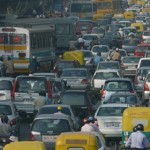The odd-even car scheme in Delhi has put air pollution control on the citizens’ agenda. Implementing it as a top priority has convinced citizens that the Arvind Kejriwal Government considers the present situation as an emergency.
It is but the first step to improving air quality. There are a wide swathe of other urgent measures required in Delhi, and then in the entire National Capital Region. These include curbing the burning of grass, improving efficiency in coal power stations, building new by-roads and creating alternate mobility methods.
1. Another citizens’ movement is required to stop the burning of grass and dried leaves in gardens and on the roadside, which is rampant. Incomplete combustion in open fires not only emits soot particles into the air but also carcinogens like dioxin. The garbage dumps at Wazirpur and other areas are the worst offenders, releasing methane also into the air.
2. Burning firewood, charcoal and coal for cooking and heating is an environmental and domestic challenge, which can be overcome by an additional subsidy to make LPG cylinders affordable to the poorest families.
3.New equipment is urgently needed in coal-burning power stations at Badarpur and NCR, including effective electrostatic precipitators for improving flue gas quality. A solution will be to import electricity from NTPC, creating continuous power supply which will eliminate the thousands of polluting captive diesel gensets so ubiquitous across Delhi.
4. Alternate mobility in the form of Electric Bicycles are affordable if mass produced, and much more practical than electric cars. Convenient charging points, the ‘pedal home’ option if batteries run out, secure parking and ease of use, can take a million fossil-fuelled vehicles off the road in quick time.
5.Construction of by-pass roads for heavy trucks is a no-brainer. According to the Centre for Science and Environment, nearly 40,000 trucks trundle through Delhi every day, smogging it up. CNG, a non polluting fuel, should be compulsory for autos and all commercial vehicles.
6.The quality of petrol and diesel supplied by our refineries is below international standards. the Sulphur content can be reduced, but new regulations for desulphurisation have yet to be implemented. We have some of the most modern refineries in the private sector; they should produce world class petrol and diesel. India can easily retire the 60-year-old public sector refineries which produce second quality petrol and diesel, and install LNG bottling plants in refineries that are still flaring methane 365 days a year, conserving energy.
7. Banning registration of new cars and allowing old, smoking cars to ply, is a wrong decision. Insist instead that vehicles over 15 years old have valid PUC certificates and impound those which emit black smoke. New Car engines must also be upgraded, fitted mandatorily with catalytic converters to conform to Bharat VI and Bharat V.
How can these next steps be successfully implemented? The odd-even formula is working because it involves leaders as well as common citizens. The media dissected every announcement, giving the government the opportunity to reinforce its ideas and it gave the scheme the widest possible publicity.
The same Mission mode can be adopted, but with some patience. At the citizen level, for instance, every garden-owner must be encouraged to have a compost pit before banning burning of grass and leaves. Delhi’s civic employees must have adequate woolen outer wear to prevent them from huddling round open fires in winters, and the poor must have affordable LPG cylinders and woollen garments, before banning fires and firewood chulas.
At the policy and instituional level, there must be continuous power availability through the installation of a bank of 30MW Natural Gas Turbine power stations within six months, before shutting down the thousands of Diesel Gensets polluting the residential areas. Coal-burning industries without flue gas scrubbers and precipitators, can then be shut down, and stone quarries screened away from the city limits.
An idea for e-cycles: They’re available locally, but are expensive. So import a million of them first, Then “make in India” another million every year, Affordably and tax-free.
Reducing use of cars is of course a laudable idea. However, forcing assets, acquired with citizen’s hard-earned money, to be idle for 50% of working days, is a national waste. It will affect businesses, productivity and growth. The Odd-Even scheme then should only be a temporary measure till other, longer-term ones take effect. The Japanese followed a similar plan before they built their first bullet train. Surely we can follow their virtuous example.
Indrashil C Rao is a retired Vice-Admiral of the Indian Navy and an active member of Mumbai Docklands Regeneration Forum. He can be found on Twitter @IndrashilRao
This blog was exclusively written for Gateway House: Indian Council on Global Relations. You can read more exclusive content here.
For interview requests with the author, or for permission to republish, please contact outreach@gatewayhouse.
© Copyright 2016 Gateway House: Indian Council on Global Relations. All rights reserved. Any unauthorized copying or reproduction is strictly prohibited.


